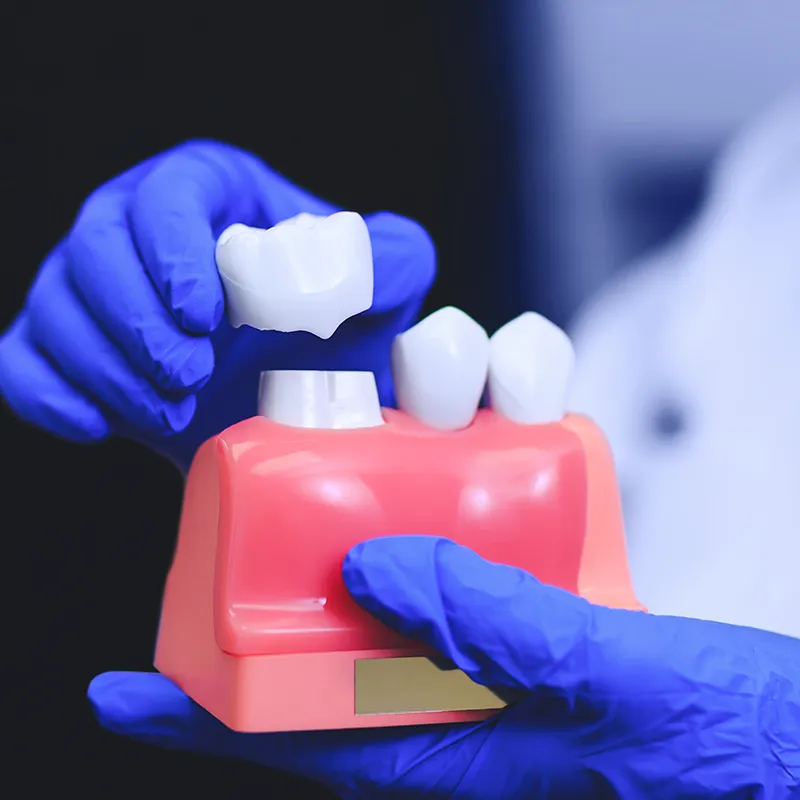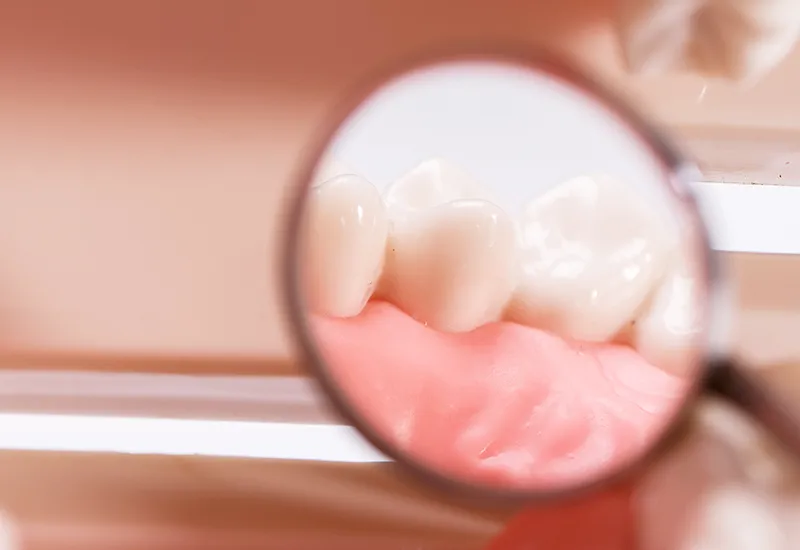Dental Crowns
Restore strength, structure, and natural look
Dental Crowns
Restore strength, structure, and natural look
Rebuild your smile with a dental crown
Life’s tough on teeth. Cracks, decay, old fillings, root canals—sometimes a tooth just can’t keep up. If one’s letting you down, a dental crown might be the perfect fix.
At Alma Dental Surgery, we combine precision and compassion to restore your tooth with care that’s calm, honest, and always tailored to you. Our crowns are crafted to feel natural, function beautifully, and blend right in—so you can chew confidently, smile freely, and enjoy the little things again.
Dental crowns
A dental crown—sometimes called a “cap”—is a custom-made restoration that covers the entire visible part of a tooth. It restores strength, shape, and appearance while protecting the tooth from further damage. Each crown is carefully crafted to blend in naturally with your smile.
We may suggest a dental crown if:
- A tooth is cracked, broken, or significantly worn down
- There’s a large filling that compromises the remaining tooth structure
- A tooth has had root canal treatment and needs extra protection
- A dental implant requires a final restoration
- You’d like to improve the appearance of a discoloured or misshapen tooth

Choosing the right dental crown
Crowns come in a variety of materials—each with its own advantages in strength, appearance, and durability. We’ll guide you through the options and recommend what suits your tooth, lifestyle, and goals best.
- Porcelain or ceramic crowns are often chosen for their lifelike appearance. These crowns are crafted to closely match the colour and translucency of natural teeth, making them a popular choice for front teeth and other visible areas of the mouth. Because they’re metal-free, they’re also suitable for patients with metal sensitivities or those seeking a more natural look.
- Porcelain-fused-to-metal (PFM) crowns combine a strong metal base with a porcelain outer layer for improved aesthetics. They offer a good balance between durability and appearance and can be used on both front and back teeth. However, over time, a dark line may become visible at the gumline, especially if gum recession occurs.
- Zirconia crowns are made from a modern ceramic material known for its exceptional strength and durability. They’re an excellent option for both front and back teeth, especially in cases where additional reinforcement is needed—such as for patients who clench or grind their teeth. Zirconia also provides a natural-looking finish and is highly resistant to wear.
- Gold or full metal crowns may not be as visually discreet, but they are incredibly durable and long-lasting. These crowns are especially effective on molars, where strength and resistance to chewing forces are most important. Gold crowns also require less removal of the natural tooth and are gentle on opposing teeth, making them a reliable option in the right situations.
How we do dental crowns
We keep things calm, clear, and centred on you. If you need a crown, we’ll walk you through each step—taking the time to explain your options and make sure you feel confident and cared for.
1. Consultation and assessment
Your journey begins with a comprehensive dental examination, including digital imaging such as X-rays. This allows your dentist to assess the condition of the tooth and surrounding structures. We’ll discuss your treatment options and determine whether a crown is the most suitable choice based on your needs.
2. Tooth preparation
To ensure a proper fit, the tooth is gently reshaped by removing a thin layer of enamel. This creates the space needed for the crown to sit securely and comfortably. After reshaping, digital or physical impressions are taken to guide the design of your custom crown.

3. Temporary crown (if needed)
If your crown is being made in a dental laboratory, a temporary crown may be placed to protect the prepared tooth and maintain your smile’s appearance in the meantime. This also helps reduce sensitivity during the interim period.
4. Crown placement
Once your final crown is ready, we’ll carefully check the fit, colour, and bite to ensure it feels natural and comfortable. When everything is just right, the crown is securely bonded to the tooth using a strong dental adhesive.
We’ll also provide care tips to help you maintain your new crown and ensure it remains in great shape for years to come.
Why get a dental crown?

- Restores strength and function to teeth weakened by decay, large fillings, or trauma
- Protects damaged or treated teeth, such as after root canal therapy, from further breakdown
- Improves the appearance of teeth that are discoloured, misshapen, or severely worn
- Custom-made for a natural look, carefully matched to the colour and contour of your surrounding teeth
- Durable and long-lasting, withstanding normal biting and chewing forces when cared for properly
- Supports overall oral health by stabilising compromised teeth and preserving bite alignment
Are there any risks or considerations?
As with any dental procedure, dental crowns have some potential risks and limitations. Your dentist will thoroughly explain these during your consultation so you can make an informed and confident decision.
- Tooth sensitivity may occur after placement, especially to hot or cold foods and drinks. This often settles over time.
- Cement wear or failure can cause the crown to loosen if not properly maintained or checked regularly.
- Chipping or fracture is rare with modern materials, but possible—especially if you grind your teeth or bite hard objects.
- Gum irritation or inflammation can develop around the crown if oral hygiene isn’t maintained.
- Future replacement may eventually be needed, as no dental restoration lasts forever. Lifespan depends on care, habits, and material used.
At Alma Dental Surgery, we take a conservative, health-first approach to treatment planning. Our goal is always to preserve your natural teeth, provide long-term function, and ensure you fully understand all your options.

Dental crown questions answered
With proper oral hygiene and routine dental check-ups, crowns can last 10 to 15 years or more. Their longevity depends on factors such as the crown material, its location in the mouth, your oral habits (like grinding or clenching), and how well you care for it.
Yes. Modern crowns—especially those made from porcelain or zirconia—are designed to closely match the colour, shape, and contour of your natural teeth. Once placed, most people won’t be able to tell it’s there.
The procedure is generally not painful. Local anaesthesia is used during tooth preparation to ensure your comfort. After placement, you may experience mild sensitivity or tenderness, but this usually settles within a few days.
Yes. Once your crown is securely fitted, you can eat and chew as you normally would. That said, it’s best to avoid very hard or sticky foods—especially immediately after placement or if you grind your teeth.
While crowns are commonly used to restore teeth weakened by decay, fractures, or root canal treatment, they’re also used for cosmetic improvements—such as covering severely discoloured or misshapen teeth.
Absolutely. While the crown itself won’t decay, the natural tooth underneath is still vulnerable to decay and gum disease. It’s important to continue brushing, flossing, and visiting your dentist regularly to keep both your crown and surrounding teeth healthy.
Let’s restore your tooth—and your confidence

If a tooth is letting you down, a dental crown can bring it back to full strength—functionally and aesthetically. At Alma Dental Surgery, we combine precision dentistry with a personal touch, guiding you through the process with clarity, care, and zero judgment.
Book your consultation today and take the first step toward a stronger, healthier smile you can feel confident about.
* Any dental procedure carries risks. Results may vary between individuals. A consultation with one of our dentists is required to assess your suitability for a dental crown and to discuss potential risks, benefits, and alternative options.
